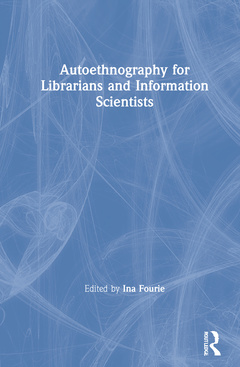Autoethnography for Librarians and Information Scientists
Coordonnateur : Fourie Ina

Autoethnography for Librarians and Information Scientists illustrates that autoethnography is a rich qualitative research method that can enhance understanding of one?s own work experiences, whilst also facilitating the design of tailored experiences for a variety of audiences.
Starting with the position that librarians and information scientists require deep insight into people?s experiences, needs and information behaviour in order to design appropriate services and information interventions, this book shows that using only conventional methods, such as questionnaires and focus groups, is insufficient. Arguing that autoethnography can provide unique insights into users? cultural experiences and needs, contributors to this volume introduce the reader to different types of autoethnography. Highlighting common challenges and clarifying how autoethnography can be combined with other research methods, this book will empower librarians and information scientists to conceptualise topics for autoethnographic research, whilst also ensuring that they adhere to strict ethical guidelines. Chapters within the volume also demonstrate how to produce autoethnographic writing and stress the need to analyse autoethnographies produced by others.
Autoethnography for Librarians and Information Scientists is essential reading for any librarian, information scientist or student looking to deepen their understanding of their own experiences. It will be particularly useful to those engaged in the study of service provision, user studies and information behaviour.
Part 1: Introduction to Autoethnography as a Research Method for Librarians
1. What is Autoethnography?
Ina Fourie
2. Practice to Theory: The Case for Autoethnography
Anne-Marie Deitering
Part 2: Different Types of Autoethnography
3. Evoking is as Evoking Does: Understanding the Work/Role of Evocative Autoethnography
Lisa P. Spinazola, Carolyn Ellis and Arthur Bochner
4. Analytic Autoethnography
Ina Fourie
5. Collaborative Autoethnography as Method and Praxis: Self-reflexivity, Sociocultural Understanding, and Beyond
Heewon Chang and Kathy-Ann Hernandez
Part 3: Challenges of Autoethnography
6. End-to-end Rigor in Autoethnography
Tim Gorichanaz
7. Ethical Challenges and Protection of Privacy
Anika Meyer and Ina Fourie
8. Supplementary and Alternative Methods: Dervin’s Sense-making Methodology
Christine Urquhart and Louisa Lam
Part 4: Authoethnography in Context
9. Autoethnography: A Tool for Cultural Competence and Working with Indigenous Communities
Fiona Blackburn
10. Autoethnography, Law Enforcement and Libraries
Naailah Parbhoo-Ebrahim and Ina Fourie
11. Caregiving and Autoethnography: A Librarian Perspective Reinforced by Experience as an Academic and Researcher
Olívia Pestana
Part 5: The Way Forward
12. Autoethnography, Personal Growth and Keeping Momentum
Ina Fourie
13. Concluding Remarks
Ina Fourie is a full professor and Head of Department of Information Science, University of Pretoria. Professor Fourie is currently Vice Chair of the ISIC (Information Seeking in Context) Steering Committee and part of the ASIS&T (Association of Information Science and Technology) Executive Board as Treasurer. She has published more than 130 articles, books and conference papers and has presented in more than 16 countries.
Date de parution : 06-2021
15.6x23.4 cm
Date de parution : 06-2021
15.6x23.4 cm
Thème d’Autoethnography for Librarians and Information Scientists :
Mots-clés :
Collaborative Autoethnography; Autoethnography; Medical Library Association; Librarians; Autoethnographic Research; Information scientists; Autoethnographic Writing; Service provision; Evocative Autoethnography; Information behaviour; Autoethnographic Researcher; Autoethnographic Work; Analytical Autoethnography; Information Literacy Training; Clinical Librarians; Leadership Development; Hospital Libraries; Prison Librarians; CMR; Autoethnographic Story; Critical Autoethnography; Autoethnography Methodology; Informal Persons; Reflective Practices; IRB; Institutional Review Board; Torres Strait Islander Library; Sage Handbook; Torres Strait Islander People; Central Western Queensland
